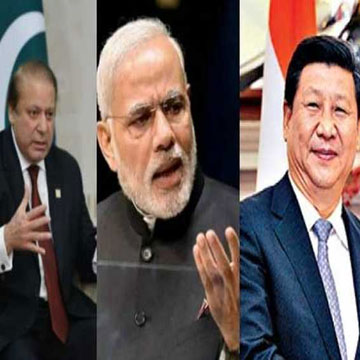 LONDON:
LONDON: China remains India's primary security challenge because of its assertiveness on the border dispute, a report by a think-tank in the UK said today.
The 'Strategic Survey 2016: The Annual Review of World Affairs' by the International Institute for Strategic Studies (IISS) said India's relations with Pakistan and Nepal had deteriorated in the past year but China remained a primary concern because of its assertiveness on the border dispute.
"For policymakers in New Delhi, this created fears of encirclement and hardened their attitude towards Beijing, even as China continued to be India's largest trading partner, and [Prime Minister] Modi sought to establish stronger trade and investment links with Beijing," the report said.
The annual survey reviewed India's troubled relationship with Pakistan and referred to the intensive "retaliatory" firing across the Line of Control (LoC) under the current Narendra Modi-led government, "fluctuations" in the dialogue process and the terror attack on Pathankot airbase.
The report said: "India's major security threat remained the terrorism emanating from Pakistan, on which Modi took a tougher position than his predecessor.
"As ever, the main driver of Pakistan's security policy was its rivalry with India. This consideration trumped all other factors."
The survey also felt India's "neighbourhood first" policy had not paid off beyond Bangladesh and Bhutan.
"This was due to the complex domestic politics of countries in the region, their historical suspicion of India as the dominant regional power, the influence of India domestic and ethnic politics, and increasing Chinese engagement with the region," it said. On its assessment of India, the IISS review highlighted that by mid-2016, Prime Minister Narendra Modi had made official visits to nearly 40 countries in two years.
"While his efforts had the immediate effect of raising India's global profile and emphasising his commitment to diaspora communities, they centred on substantive policies designed to strengthen the country's economy. And Modi appeared to be succeeding: India's GDP grew by 7.6 per cent in 2015-16, a rate higher than that of any other large country," the report says. On a global level, it concludes that "rising populism and intractable conflict" shook the international system in the year to mid-2016.
"Worldwide dissatisfaction with ruling elites and resistance to globalisation appeared to reach a crescendo. Wars across the Middle East showed little sign of abating. The increasing assertiveness and military capabilities of China and Russia amplified competition, and the attendant risk of conflict, between major powers," it said.
 LONDON: China remains India's primary security challenge because of its assertiveness on the border dispute, a report by a think-tank in the UK said today.
LONDON: China remains India's primary security challenge because of its assertiveness on the border dispute, a report by a think-tank in the UK said today.